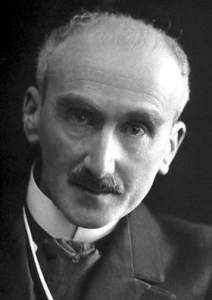 Henri Bergson
Henri Bergson
Henri-Louis Bergson (18 October 1859 – 4 January 1941) was a major French philosopher, influential especially in the first half of the 20th century. Bergson convinced many thinkers that the processes of immediate experience and intuition are more significant than abstract rationalism and science for understanding reality.
He was awarded the 1927 Nobel Prize in Literature “in recognition of his rich and vitalizing ideas and the brilliant skill with which they have been presented”. In 1930, France awarded him its highest honour, the Grand-Croix de la Legion d’honneur.
Bergson was born in the Rue Lamartine in Paris, not far from the Palais Garnier (the old Paris opera house) in 1859. His father, the pianist Michał Bergson, was of a Polish Jewish family background (originally bearing the name Bereksohn). His mother, Katherine Levison, daughter of a Yorkshire doctor, was from an English and Irish Jewish background. The Bereksohns were a famous Jewish entrepreneurial family of Polish descent. Henri Bergson’s great-great-grandfather, Szmul Jakubowicz Sonnenberg, called Zbytkower, was a prominent banker and a protégé of Stanisław August Poniatowski, King of Poland from 1764 to 1795.
Henri Bergson’s family lived in London for a few years after his birth, and he obtained an early familiarity with the English language from his mother. Before he was nine, his parents crossed the English Channel and settled in France, Henri becoming a naturalized French citizen.
Henri Bergson married Louise Neuberger, a cousin of Marcel Proust (1871–1922), in 1891. (The novelist served as best man at Bergson’s wedding.) Henri and Louise Bergson had a daughter, Jeanne, born deaf in 1896. Bergson’s sister, Mina Bergson (also known as Moina Mathers), married the English occult author Samuel Liddell MacGregor Mathers, a founder of the Hermetic Order of the Golden Dawn, and the couple later relocated to Paris as well.
Bergson lived the quiet life of a French professor, marked by the publication of his four principal works:
- in 1889, Time and Free Will (Essai sur les données immédiates de la conscience)
- in 1896, Matter and Memory (Matière et mémoire)
- in 1907, Creative Evolution (L’Evolution créatrice)
- in 1932, The Two Sources of Morality and Religion (Les deux sources de la morale et de la religion)
In 1900 the College of France selected Bergson to a Chair of Greek and Latin Philosophy, which he held until 1904. He then replaced Gabriel Tarde in the Chair of Modern Philosophy, which he held until 1920. The public attended his open courses in large numbers.
Source: Wikipedia, Henri Bergson

Mind-energy: Lectures and Essays (1920) by Henri Bergson
The Two Sources of Morality and Religion
Creative Evolution